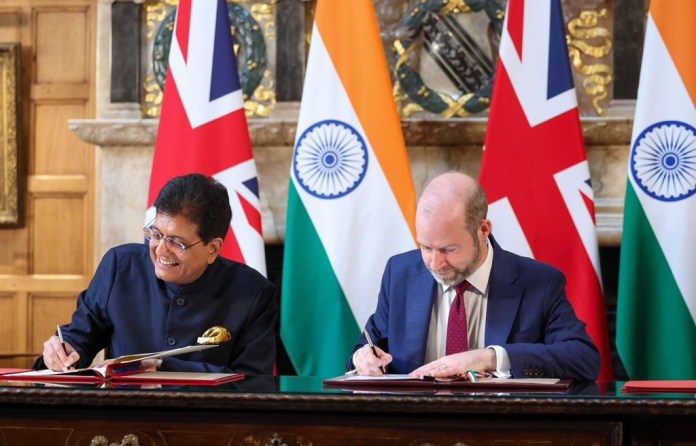In a significant move, India and the United Kingdom signed a Free Trade Agreement (FTA) on Thursday, July 24. Officially titled India-UK Comprehensive Economic and Trade Agreement (CETA), the agreement was signed during the Prime minister Narendra Modi’s official visit to London. The step marks India’s first major bilateral trade deal with a developed economy in over a decade. After the approvals of the UK parliament and India’s Union Cabinet, it is expected the trade deal will come into force within a year.
The agreement was signed by Union Commerce Minister Piyush Goyal and the UK’s Secretary of state for Business and trade, Jonathan Reynolds. The decision was followed by the bilateral ties between PM Modi and the British counterpart Keir Starmer in London.
In a post on X, Goyal congratulated Modi, Starmer, and the people of both nations on the mutual deal with the India-UK Comprehensive Economic and Trade Agreement (CETA). He stated that this accord will unlock the duty-free access for about 99% of Indian exports, which will open the gate for $23 billion in opportunities for labour-intensive sectors, marking a new era for inclusive and gender-equitable growth.
Congratulations to Prime Minister @NarendraModi ji, UK Prime Minister @Keir_Starmer, and the people of India & the United Kingdom on the signing of the landmark India-UK Comprehensive Economic and Trade Agreement (CETA).
Duty-free access for about 99% of Indian exports unlocks… pic.twitter.com/AWAwVTwtrg— Piyush Goyal (@PiyushGoyal) July 24, 2025
Workers and labourers like artisans, weavers, daily wage labourers who work in different verticals like textiles, leather, footwear, gems & jewellery, toys, and marine products will step into a new phase of prosperity. The FTA will mark a historic leap for women with the help of improved access to finance and deeper integration into the global value chain. For people working in village looms to tech labs, this agreement will benefit all.
Goyal added that it is also a win-win for farmers who can have access to duty-free export 95% of their agricultural products, while fisherfolk gain from Zero Duty on 99% of marine exports, boosting their incomes. India’s plantation sector is also expected to benefit greatly, including tea and coffee. Duty-free access on instant coffee will help Indian exporters compete better with European suppliers.
In the manufacturing sector, it will also have a transformative impact on multiple sectors like engineering goods, electronics, pharma, chemicals, food processing, and plastics. The agreement will ensure the Indian customers get high quality goods at competitive prices.
Notably, Engineering goods form the largest category under the FTA, with 1,659 tariff lines and a 17%t share. This includes machinery, equipment, and components.
The UK has signed a trade deal with India – the largest agreement Britain has signed since leaving the European Union.
Watch the moment herehttps://t.co/yQEsoSDgsp
Sky 501, Virgin 602, Freeview 233 and YouTube pic.twitter.com/LJHdfOHNib
— Sky News (@SkyNews) July 24, 2025
India’s electronics exports, including smartphones, optical fiber cables, and inverters, are expected to increase with zero-duty access. Software and IT-enabled Services businesses will also benefit from the FTA.
Moreover, the IT services and education will gain easier access to the UK’s high-value markets. The three-year exemption from social security payments in the UK under the Double Contribution Convention marks a major step forward for Indian professionals and their employers. This will especially benefit chefs, yoga teachers, musicians, and business travellers, helping India move closer to becoming a global talent hub.
The India-UK Free Trade Agreement will give Indian startups better access to UK customers, investors, and innovation centres, boosting their global reach. This agreement supports the goals of ‘Make in India’ and ‘Vocal for Local’ by creating jobs, strengthening communities, and enhancing India’s position in global trade. It signals a fresh chapter in economic cooperation and deepens our trade partnership with the UK.
Additionally, there will be some tariff changes and concessions on goods and services agreed upon by both countries. Import duties on Scotch whisky and gin will drop from 150% to 75% immediately, and to 40% over the next 10 years. Tariffs on UK-manufactured cars, which currently exceed 100%, will be cut to 10% under a quota-based system. India will reduce or eliminate tariffs on products like cosmetics, salmon, chocolates, biscuits, and medical devices.

